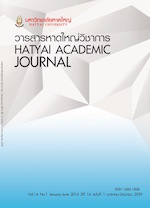สิทธิชุมชนกับการพิทักษ์เขาคูหา
Main Article Content
Abstract
บทความนี้มีวัตถุประสงค์นำเสนอเรื่อง สิทธิชุมชนกับการพิทักษ์เขาคูหา เพื่อตรวจสอบการใช้สิทธิชุมชน
ตามรัฐธรรมนูญสำหรับการแก้ปัญหาความขัดแย้งในพื้นที่ อันเนื่องมาจากการที่รัฐให้สัมปทานบัตรแก่เอกชนในการทำเหมืองหิน โดยการออกสัมปทานบัตรของรัฐส่งผลกระทบต่อชาวบ้านที่อาศัยในชุมชนรอบเขาคูหามานานกว่า 20 ปี ความขัดแย้งระหว่างชาวบ้านกับบริษัทเอกชนทำเหมืองหินเขาคูหานั้น เห็นได้ชัดเจนขึ้นในช่วงเดือนพฤศจิกายน 2552 เมื่อชาวบ้านทราบว่าประทานบัตรในการทำเหมืองหินของบริษัทเอกชนหมดอายุลง จึงทำการรวมกลุ่มกันในนามเครือข่ายผู้ได้รับผลกระทบจากการทำเหมืองหินเขาคูหา อำเภอรัตภูมิ จังหวัดสงขลา โดยได้ยื่นหนังสือต่อรัฐบาลในสมัยที่ อภิสิทธิ์ เวชชาชีวะ ดำรงตำแหน่งนายกรัฐมนตรี เพื่อขอให้ชะลอการต่ออายุประทานบัตรการทำเหมืองหินเขาคูหา ทำให้บริษัทเอกชนไม่สามารถต่ออายุประทานบัตรได้ และส่งผลให้บริษัทไม่สามารถประกอบกิจการเป็นเวลา 7 ปี นับแต่ปี พ.ศ.2552 ถึงปี พ.ศ.2558 นอกจากนี้ ชาวบ้านบางส่วนได้ยื่นฟ้องคดีต่อบริษัท เพื่อเรียกร้องค่าเสียหายจากผลกระทบในการทำเหมือง คดีถึงที่สุดในวันที่ 20 มกราคม 2558 เมื่อศาลฎีกาตัดสินให้บริษัทเอกชนชดเชยค่าเสียหายต่อชาวบ้าน แต่นั่นก็ไม่ได้หมายความว่าจะเป็นการปิดฉากการทำเหมืองหินในพื้นที่เขาคูหาตลอดไป เพราะว่าเขาคูหาก็ยังคงเป็นแหล่งสัมปทานเหมืองหินอยู่เช่นเดิม ตราบใดที่เป้าหมายสูงสุดของการเคลื่อนไหวยังไม่บรรลุผล นั่นคือ การขอให้รัฐประกาศยกเลิกเขาคูหาเป็นแหล่งสัมปทานเหมืองหินอย่างถาวร การต่อสู้เคลื่อนไหวเพื่อพิทักษ์เขาคูหาก็ยังต้องดำเนินต่อไป
Community Rights and the Protection of Khao Khuha
This article titled ‘Community Rights and the Protection of Khao Khuha (Khuha hill)’ aims to examine the rights of community, according to the constitution, to solve social conflicts in a specific area. There was a conflict in Khao Khuha area when the government granted a concession allowance to a private mining company whose mining activities had critical impacts on the residents living in the area nearby for over two decades. Not until November 2009, the conflict between the residents and the company became more serious when the residents realized the concession allowance was expired. After forming up a group called ‘‘a people network of Khao Khuha’s negative mining effects’’, the residents submitted a letter
requesting the Prime Minister Aphisit Vejjajiva to slow down the concession renewal for the company. Not only not being able to renew its seven year concession from 2009 to 2015, but the company was sued by the residents to be in charge of their damages caused by the mining. It was on January 2015 that the Supreme Court ordered the company to compensate for the damages. However, that meant not the mining had no longer remained in the area. As long as the community’s expectation in convincing the government to pass regulation on preventing the Khao Khuha from being a mining site is not achieved, the conflict continues.
Article Details
All published articles are evaluated by three qualified peer reviewers from various institutions through a double-blind process, where reviewers do not know the authors’ identities and authors do not know the reviewers’ identities. The content and articles in the Hatyai Academic Journal reflect the authors’ views only and are neither the opinions of the editorial board nor the responsibility of Hatyai University. The Editorial Board of the Hatyai Academic Journal allows articles to be reproduced for academic purposes, on the condition that the original source is clearly cited.


